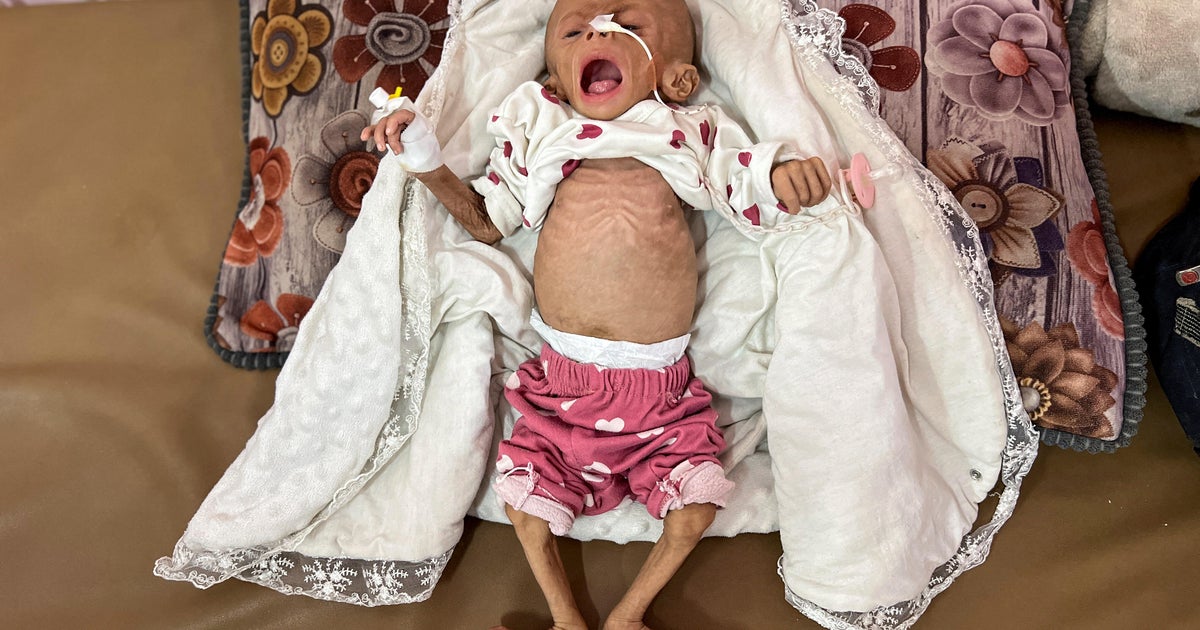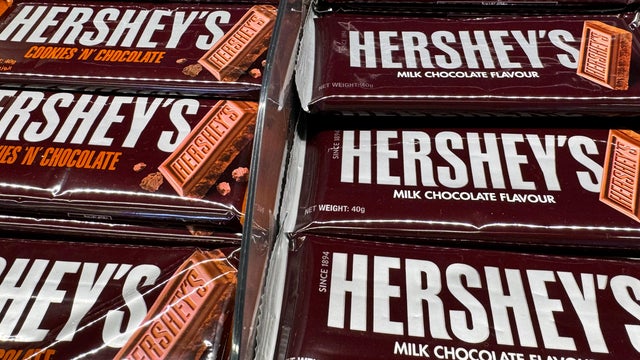

No response returned

Gaza City — The head of Al-Shifa hospital in Gaza City said on Tuesday that 21 children had died across the Palestinian territory in the past three days "due to malnutrition and starvation."
"These deaths were recorded at hospitals in Gaza, including Al-Shifa in Gaza City, Al-Aqsa Martyrs Hospital in Deir el-Balah and Nasser Hospital in Khan Yunis ... over the past 72 hours," Mohammed Abu Salmiya told reporters.
United Nations Secretary General Antonio Guterres warned Monday evening that "the last lifelines keeping people alive are collapsing" in Gaza, and that there were growing reports of children and adults exhibiting symptoms of malnutrition.
Abu Salmiya told reporters that new cases of malnutrition and starvation were arriving at Gaza's remaining functioning hospitals "every moment," adding: "We are heading towards alarming numbers of deaths due to the starvation inflicted on the people of Gaza."
In a statement issued Tuesday, the U.N. human rights office said many people were arriving at Gaza's hospitals "in a state of severe exhaustion caused by a lack of food. Others are collapsing in the streets. Many more may be dying unreported ... These deaths and the horrendous physical and psychological suffering caused by hunger are the result of Israel's interference with and militarization of humanitarian assistance."
Photos emerging from Gaza in recent days have shown children and infants with severe malnutrition, including some said by hospital workers to have died of the condition. According to the National Institutes of Health, severe malnutrition typically causes symptoms including dramatic wasting, or fat and muscle loss, poor circulation and extreme fatigue.
"Hospitals are already overwhelmed by the number of casualties from gunfire. They can't provide much more help for hunger-related symptoms because of food and medicine shortages," Khalil al-Deqran, a spokesperson for the Hamas-run Gaza Ministry of Health, told the Reuters news agency. Deqran said there were 600,000 people suffering from malnutrition symptoms such as dehydration and anemia, including 60,000 pregnant women.
After talks to extend a six-week ceasefire broke down, Israel imposed a full blockade on Gaza on March 2 this year, allowing no aid in until trucks were again permitted to cross the border in late May. The U.N. and aid organizations say the quantity of food and other emergency supplies being allowed into Gaza since then has been vastly insufficient, however.
Food stocks accumulated inside the Palestinian territory during the ceasefire have depleted, leaving the territory's more than two million inhabitants experiencing the worst shortages since the start of the on Oct. 7, 2023. Some 1,200 Israelis were killed and 251 others taken hostage during that siege more than 650 days ago, and 20 of the captives are still thought to be alive in Gaza.
World Food Program director Carl Skau, who visited Gaza City in early July, called the situation "the worst" he had ever seen.
Last Sunday, the civil defense agency in Hamas-run Gaza reported that at least three infants had died from "severe hunger and malnutrition" over the previous week.
On Monday, the governments of 25 countries, including Israeli and U.S. allies Britain, France, Australia and Canada, , the unconditional release of Israeli hostages held by Hamas, and the free flow of aid.
In their joint statement, they accused Prime Minister Benjamin Netanyahu's U.S.-backed government of the "drip feeding of aid and the inhumane killing of civilians, including children" in Gaza.
The nations also condemned a new system for aid distribution backed by Israel's military that was launched in late May with the support of the Trump administration, but no support from other nations or humanitarian organizations.
The U.N.'s human rights office said Tuesday that Israeli forces have killed more than 1,000 Palestinians trying to get food aid in Gaza since the started operations on May 26.
Officially a private effort, the GHF began working in Gaza — with virtually no information provided about its funding or management — after Israel imposed the more than two-month blockade on all supplies entering Gaza.
The group's operations, focused around four "humanitarian hubs" for food distribution, have been marred by chaotic scenes and near-daily reports of Israeli forces firing on people waiting to collect rations in the Palestinian territory, where the Israeli military is seeking to destroy Hamas.
"As of July 21, we have recorded 1,054 people killed in Gaza while trying to get food; 766 of them were and 288 near U.N. and other humanitarian organizations' aid convoys," U.N. human rights office spokesman Thameen Al-Kheetan told the AFP news agency. He said the agency's data was "based on information from multiple reliable sources on the ground, including medical teams, humanitarian and human rights organizations."
GHF says it has distributed more than 1.4 million boxes of foodstuffs to date and that it adjusts its "operations in real time to keep people safe and informed, and we stand ready to partner with other organizations to scale up and deliver more meals to the people of Gaza."
The U.N. and major aid groups have refused to cooperate with the GHF over concerns it was designed to cater to Israeli military objectives and violates basic humanitarian principles. The group has never commented, despite numerous questions from TheNews, on any links it has with the U.S. or Israeli governments.
The Trump administration announced its first public support for the GHF — $30 million in funding — earlier this month, and called on other organizations and countries to cooperate with the group, saying that, in its view, it provides the only means of delivering aid in Gaza without the risk of Hamas stealing it.





